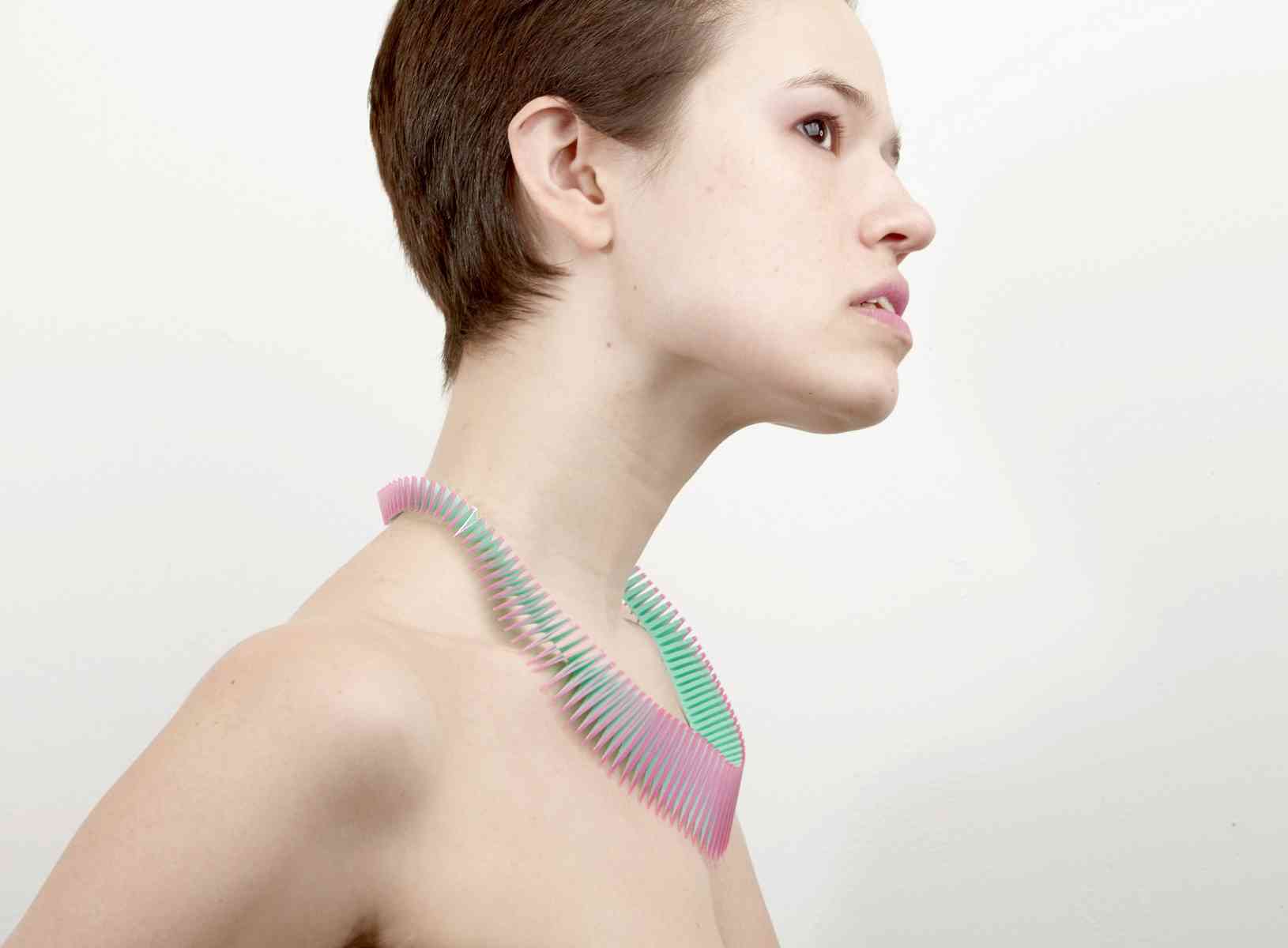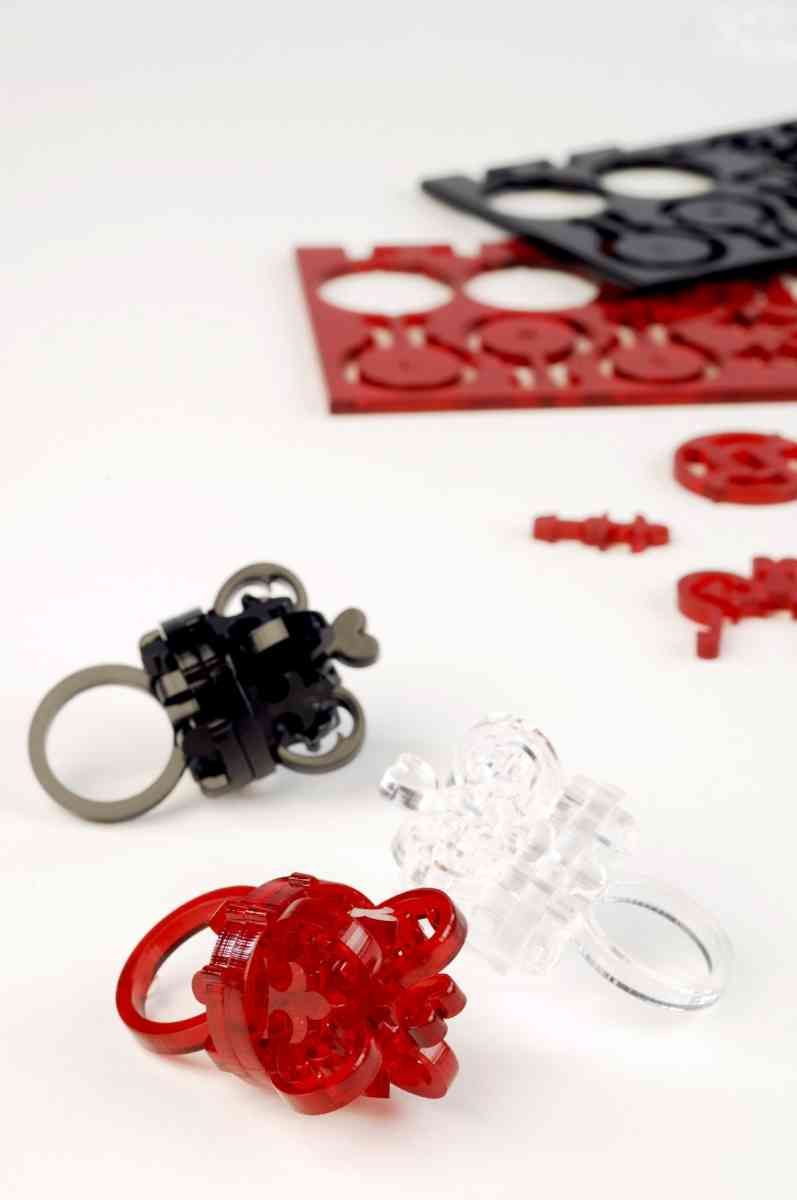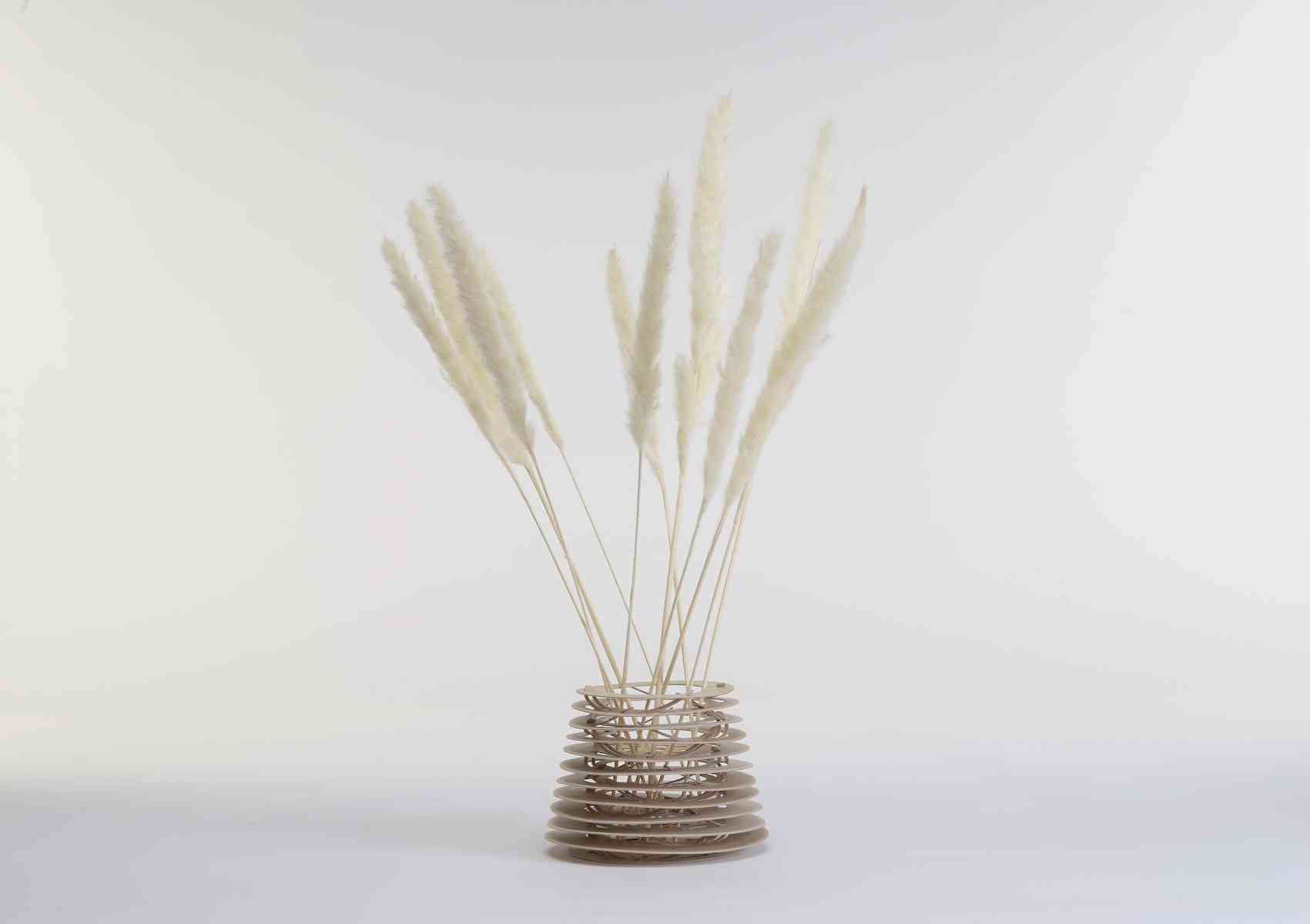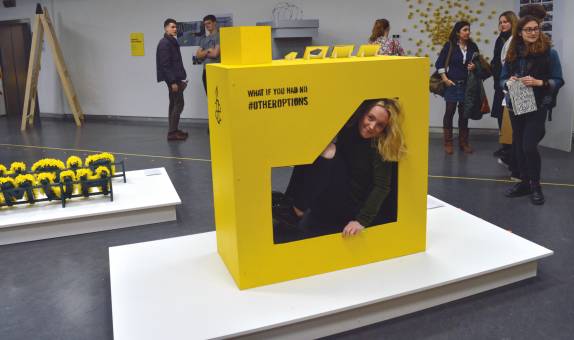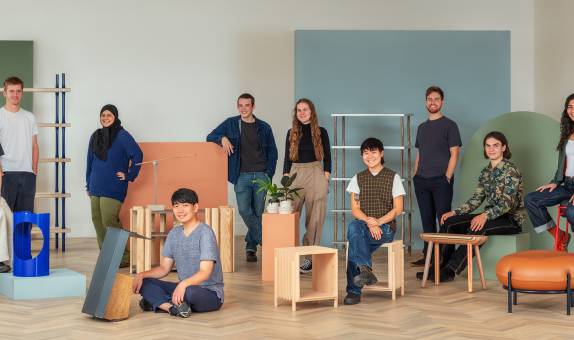3D Design Innovation BA (Hons)
Why choose this course?
In the BA(Hons) 3D Design Innovation course at Kingston School of Art, you will master digital making and diverse technological skills through scalable projects, while cultivating entrepreneurial and enterprise ambitions. As a designer, your problem-solving abilities will help shape society and design sustainable futures. This course features 'Adventure Learning', where your responses to real-world community or business challenges are open-ended, encouraging you to become a critical social detective who creates sustainable and socially impactful solutions.
This course will give you the opportunity to emerge as an innovative thinker ready to address global challenges with a responsible mindset. Integrated within the industry-facing 3D Design Department, this course offers unique interdisciplinary collaborations, enriching your learning experience. If you aim to merge creativity with practical skills and strategic vision, BA (Hons) 3D Design Innovation provides unmatched tools and opportunities to shape your career and influence the design field.
| Attendance | UCAS code | Year of entry |
|---|---|---|
| 3 years full time | W240 | 2025 |
| 3 years including professional placement | W241 | 2025 |
Please note: Teaching on this course may take place on more than one KU campus.
| Main Location | Kingston School of Art, Knights Park |
Reasons to choose Kingston
- The course sits within a department that has unique industry partnerships with leading British design agencies meaning you can work closely with designers and directors in their studios.
- You will have access to all workshops to test and prototype using any process from VR to ceramics, arc welding to laser cutting, and 3D printing to Arduino.
The Art School Experience
As part of Kingston School of Art, students on this course benefit from joining a creative community where collaborative working and critical practice are encouraged.
Our workshops and studios are open to all disciplines, enabling students and staff to work together, share ideas and explore multi-disciplinary making.

What you will study
During your studies in the BA (Hons) 3D Design Innovation at Kingston School of Art, you will progressively deepen your expertise in digital design and prototyping. In Level 4, you will establish foundational skills in digital tools and sustainable design practices, focusing on small-scale projects that address societal and environmental issues. Moving into Level 5, you will expand your technical skills with advanced digital tools and tackle larger, more complex design challenges that encourage innovative thinking and strategic planning. The final year, Level 6, is dedicated to personal and professional development where you will engage in self-directed projects, culminating in a major project that demonstrates your ability to integrate design innovation with sustainability. Over the course of the program, you will cultivate entrepreneurial skills and critical thinking, preparing you to make impactful contributions to the design industry.
Year 1
Year 2
Year 3
In your first year, you will lay the foundational skills necessary for advanced study in design innovation. The 'Process: Tools of Innovation 1' module introduces you to essential digital tools for 2D drawing and 3D modelling. Through 'Practice: Thinking Through Making: Small' module, you'll tackle projects that address societal and environmental issues, fostering a mindset focused on sustainability. The 'Presentation: Start-Up (Navigate)' module will introduce you to the basics of turning creative ideas into viable projects, culminating in a Live Project that challenges you to design a product using CAD/CAM processes. Additionally, 'Materials and Making: Themes in Design History' provides a historical perspective, grounding your practical skills with theoretical knowledge.
Core modules
Process: Tools of Innovation 1
30 credits
This module introduces the tools, processes, and technologies employed in 3D digital design practice. Through a series of lectures and workshops you embrace 3D digital design and communication processes by exploring various CAD programs and CAM processes: 2D drawing and 3D modelling, digital fabrication processes, creating CAD render image, editing /retouching studio photography, and portfolio layout.
Presentation: Start-up (Navigate)
30 credits
Presentation: Start-Up underscores the significance of individual problem-solving in urgent social, environmental, and economic issues. It unveils the intricate processes behind realising creative ideas and explores how design can transform the world. Celebrating the human act of making, it recognises its pivotal role in shaping social activities. The module introduces entrepreneurship and enterprise principles, imparting you with the ability to identify, evaluate, and pursue entrepreneurial opportunities, fostering a comprehensive understanding of creative problem-solving.
This module introduces Future Skills through engagement with Navigate, emphasising individual and team activities to build confidence and skills for collaborative work and audience consultation. It develops portfolio creation skills, fostering self-selection, editing, and personal and professional identity construction. You engage with outward-facing briefs, exploring the professional landscape of 3D digital design and honing skills in problem-solving as part of a creative research process.
Practice: Thinking Through Making: Small
30 credits
This module introduces contemporary 3D digital design practice through a range of projects that integrate creative making with cognition, thinking, and reasoning. Knowledge is developed by providing solutions to today's social, environmental, and economic issues through the utilisation of materials and digital fabrication processes.
Practice: Thinking Through Making Small focuses on researching, making, and designing user experiences by introducing the fundamentals of 3D digital design practice: idea generation, problem-solving, human-centred, and planet-centred design. This module places the planet, human experience, and prototyping at its centre, developing skills that translate theoretical concepts into practical objects as core research methods. Testing and making mistakes are essential for learning, fostering innovation in the prototyping process, enabling significant leaps and the creation of radically original designs.
By exploring and using methods of communication and interaction, you gain knowledge and understanding of the target market and customers. You are encouraged to explore entrepreneurial opportunities, utilising both internal and external resources.
Materials and Making: Themes in Design History
30 credits
Materials and Making constitutes an introduction to design histories and the theoretical, historical and cultural contexts underpinning product and furniture design. Sessions address particular ideas and practices that have shaped and constructed our contemporary understanding of product and furniture design as a meaningful social, cultural and economic activity.
Attention is given to the relationship between design and contexts of production, consumers and consumption, technologies, technique, the politics of labour, materiality, and ethics/responsibility. The intertwined histories of design and modernity and modernisation will be addressed, as well as what practices, histories and conceptualisations of design were excluded from or displaced by such developments, from women designers to indigenous and vernacular craft practices.
An integral part of this module is the close consideration of designed objects and the understanding of these in relation to larger contexts of meaning and interpretation.
The second year deepens your engagement with digital tools and prototyping through more complex projects. 'Process: Tools of Innovation 2' module expands your proficiency with advanced CAD tools and introduces creative computing techniques. In 'Practice: Thinking Through Making: Medium & Large' module, you will take on larger scale projects that integrate technologies to address broader issues. 'Presentation: Scale-Up (Explore)' module sharpens your entrepreneurial skills, focusing on strategic thinking and interdisciplinary collaboration, typically involving a live event with local organisations. 'Critical Issues in Innovation Design: Research and Practice' module enriches your understanding of design within the sustainability agenda, aligning with global goals.
Core modules
Process: Tools of Innovation 2
30 credits
Process: Tools of Innovation 2 develops and supports an individual approach to the tools, processes, and technologies used within 3D digital design practice. Through a series of workshops and projects, you will embrace the process and suspend judgment by exploring making through a diverse and challenging range of interconnected media and technologies, including CAD animation, video editing, parametric design, and creative computing. These methods are presented as options that can be selected and utilised in the formation of an individual creative practice. This module advances communication and modelling processes through testing, iteration, and consultation.
Digital animation, modelling, and digital fabrication workshops are presented as specialised working environments where you can practise skills and develop your craft as a 3D digital designer.
Presentation: Scale-Up
30 credits
Presentation: Scale-Up develops and supports individual approaches to solving existing world problems rooted in urgent social, environmental, and economic concerns by revealing the elaborate processes involved in bringing creative ideas to life. Presentation modules explore how our design practice can create the potential to transform the world for the better. This module celebrates the human act of making, recognising its fundamental role in shaping our social activities and environments. The module expands your entrepreneurial and enterprise competencies, guiding you to apply strategic thinking in developing and refining innovative projects.
This module nurtures your graduate attributes, delivering the Future Skills Explore Learning Outcomes. It integrates personal development activities to solidify professional identities and global citizenship, leveraging industry networks for insights into 3D digital design practice's industrial and professional contexts. This cultivates professional skills, particularly interdisciplinary collaboration, vital for future employment across diverse disciplines.
The module critically evaluates personal development through self-reflection, exploring problems beyond 3D digital design's confines. This is reinforced by constructing a professional portfolio and development plan, evidencing skill understanding for Level 6 preparation.
Practice: Thinking Through Making: Medium & Large
30 credits
This module explores contemporary 3D digital design practice through a range of projects that integrate creative making with cognition, thinking, and reasoning. Knowledge is developed by providing innovative solutions to today's social, environmental, and economic issues through the utilisation of emerging technologies.
Practice: Thinking Through Making Medium & Large focuses on researching, prototyping, and designing user experiences, highlighting the vital role of prototypes and emerging technologies in 3D digital design. It centres on iterative prototyping processes and contextual exploration through diverse primary research methods, translating theory into practical objects and events. Testing with actual target audiences in real environments is essential for validating designs, enhancing user experience, and enabling significant leaps and the creation of radically original designs.
By exploring and using industry networks, contacts, and collaborative opportunities both inside and outside the university, you expand on your knowledge and outlook, adding rigour and credibility to your studies. You are encouraged to explore entrepreneurial opportunities, utilising both internal and external resources.
Critical Issues in Innovation Design: Research & Practice
30 credits
This module connects the contemporary practice of interaction design to wider critical issues and debates within the fields of art & design, as well as society, culture, politics, economics, philosophy, science and technology more broadly. By engaging with urgent critical questions, and experimenting with different theoretical frameworks and research methods, you will be able to identify the topics, lines of enquiry and modes of research that interest you, and which you want to pursue in independent research at Level 6.
The first part of the module explores a range of critical issues related to the production, dissemination and consumption of interaction design by applying different theoretical perspectives to contemporary case studies. The second part of the module focuses on the research methods through which interaction design can be investigated and understood.
In your final year, you will focus on personal and professional development through complex, self-driven projects. 'Practice - Personal Vision' module allows for deep exploration of personal design interests, culminating in a Major Project that synthesizes your learning and showcases your innovation capabilities. 'Presentation - Set-Up (Apply)' module transitions you from student to professional, requiring you to develop and pitch a business idea. Finally, the 'Independent Research Project in Critical and Historical Studies' module challenges you to conduct in-depth research, enhancing your critical thinking and analytical skills, and preparing you for the professional design world.
Core modules
Presentation: Set-Up (Apply)
30 credits
Presentation: Set-Up (Apply) endorses individual solutions to global issues, exposing complex processes in bringing creative ideas to life. It explores design as a force for positive transformation, celebrating the human act of making and its role in shaping social activities. The module builds on entrepreneurial concepts, focusing on advanced strategies for translating creative ideas into viable ventures, addressing urgent social, environmental, and economic concerns for a better world.
Future Skills evolve through engagement with Apply, guiding planning for ongoing personal and professional development. It fosters an individual approach to career management, strengthening professional skills, identity, and global citizenship. Recognising public presentation as a core principle, the module supports opportunities for sharing work with external audiences and collaborative partners in the field of 3D digital design practice.
You will critically evaluate personal development, reflecting on progress to enhance creative practice and explore challenges beyond the University. Personal development planning showcases evolving skills in coursework, setting goals, and taking actions to propel ambitions forward.
Independent Research Project in Critical and Historical Studies
30 credits
Building on the links between research and practice embedded at Level 5, Independent Research Project in Critical and Historical Studies module focuses on in-depth research, critical enquiry and reflection on questions and critical issues emerging in you' own practice, and pertinent to the practice of their own discipline.
Over the module, you will initiate and develop an individual research topic; identify and evaluate appropriate archives, bodies of critical literature, visual/material sources and research methods; manage your study time; engage with and respond to tutorial dialogue and peer feedback, and apply critical and analytical skills to produce an output of 5-6,000 word (or equivalent) representing the culmination of your research project. You will be supported by a series of lectures, seminars, and tutorials.
Practice: Personal Vision
60 credits
This module fosters independent 3D digital design practices through a range of applied set and self-negotiated projects that combine creative making with cognition, thinking, and reasoning; knowledge is developed through both the manipulation of materials and by taking a questioning and empathetic approach to subject matter.
Practice: Personal Vision explores researching, prototyping, and designing user experiences, emphasising social, environmental, and economic sustainability in 3D digital design. It envisions technology's transformative role in daily life, fostering individual and collective design practices with contextual awareness. This module centres on the planet, human experience, and prototyping, cultivating skills to translate theory into practical objects, encouraging learning through testing, mistakes, and innovation. Testing and making mistakes are essential for learning, fostering innovation in the prototyping process, enabling significant leaps and the creation of radically original designs.
Emphasis on research, ethics, and inclusivity allows you to formalise your unique methodologies confidently. This module solidifies understanding and personal prototyping skills. Autonomy, resilience, and self-reliance grow through self-direction, culminating in an extended project proposals, negotiation, and delivery. Analytical thinking, reflexivity, and criticality are integral. Projects establish personal practice and professional relationships.
Future Skills
Knowledge to give you the edge
Embedded within every course curriculum and throughout the whole Kingston experience, Future Skills will play a role in shaping you to become a future-proof graduate, providing you with the skills most valued by employers such as problem-solving, digital competency, and adaptability.
As you progress through your degree, you'll learn to navigate, explore and apply these graduate skills, learning to demonstrate and articulate to employers how future skills give you the edge.
At Kingston University, we're not just keeping up with change, we're creating it.

Entry requirements
Sample work
Fees and funding
After you graduate
The department has an excellent reputation for nurturing graduates who go on to be leading practitioners in 3D Design. Students studying 3D Design Innovation BA (Hons) can look forward to a broad range of professional opportunities and creative careers that may include:
- Product designer
- Spatial designer
- Design consultant
- Exhibition designer
- Experience designer
- Futurologist
- Production designer
- Marketing consultant
- Industrial design consultancies
- Technology companies
- 3D modeller and renderer
- Sustainable design specialist
- Gallery curator
- Interaction designer
- Design researcher
- Digital designer
- Producer
- Project manager
- Art director
- Creative director
- Multi-disciplinary artist
- Creative technologist
- Performer educator
- Community outreach facilitator
- Entrepreneur
- Inventor
Course changes and regulations
The information on this page reflects the currently intended course structure and module details. To improve your student experience and the quality of your degree, we may review and change the material information of this course. Course changes explained.
Programme Specifications for the course are published ahead of each academic year.
Regulations governing this course can be found on our website.



